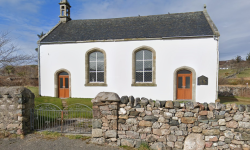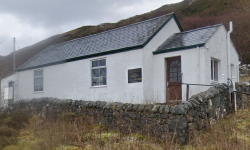Charles Sutherland was a missionary in the congregation from 1932-1946.
From the Free Presbyterian Magazine of July 1951, Vol 56(3):66-67.
The late Charles Sutherland
Lairg
WE believe that such as were well acquainted with our late friend will know that it is most difficult, in a brief sketch like this, to give a real impression of what Charles Sutherland truly was. In many respects he was not an ordinary man: he was unique and one would not need to be very long in his company in order to be fully assured of the truth of this.
Though regeneration does not run in the blood, yet we find that the seed of the godly are often the subjects of the Holy Spirit’s work. Charles’ grandparents, who lived in Birichan, in the parish of Dornoch, had a family of thirteen, and David, one of their sons, married a Christina Fraser. When their first child was born, being a daughter, David wished to call her Charlotte after his mother. His mother, who was an eminently godly woman, objected, and said she would let him know which child she wished to be called after her. When the fifth child was born on the sixth day of July, 1872, she said to the parents: “Now, this is the child on whom I desire my name to be taken.” It was for that reason the subject of this sketch was called Charles.
From a very early age, Charles had the common strivings of the Holy Spirit, and when very young he observed there was a marked difference between the Lord’s people and such as were not His people. At the age of seven years, he was given an insight in some measure of his awful condition as a lost sinner. He resorted to secret prayer. The impression then made soon faded away, however, when he met his former companions and joined with them in their sinful amusements. In after years, with much sorrow, he used to allude to this time when he quenched the Holy Spirit and left off praying. He often exhorted his own children and other young people, if ever they felt the strivings of the Holy Spirit, to be very careful not to quench them.
While yet in his boyhood days, an incident brought home to him very forcibly the reality of prayer. When herding cows, he saw a young colt which never had been “broken in,” standing close by a dyke. Charles climbed the dyke, jumped on the animal’s back, and took a firm hold of its mane. The colt bolted, and the young boy, realising his grave danger and his utter helplessness, began to repeat the Lord’s Prayer. When he had finished repeating it, the colt slowed down and stopped, allowing its boyish rider to dismount unscathed. His prayer was only what he had learned, yet God was owned, deliverance came, and a very deep impression was made upon his mind.
As a youth he was respectful and very dutiful to his parents, but he was a stranger to that grace, which made him afterwards a follower of the Lord Jesus through evil report and good report.
For a time he was much given to dancing, but how grievous and painful that sinful pleasure was made to him was often evidenced in the loving counsels he gave to those whom he kn,ew to be guilty of it. While Charles was blindly seeking happiness in the broken cisterns that sinners hew out for themselves, there were happenings in the Free Church which were giving his minister, Rev. Neil Taylor, very anxious thoughts. Mr. Taylor was a very godly man, and in many ways showed he was endowed with much spiritual discernment. Quite often, the late Rev. Donald Macfarlane, Dingwall, and ,the late Rev. Donald Macdonald, Shieldaig, assisted at the Dornoch communion. This was a disappointment to many who would have preferred the more popular ministers of the Free Church. After the General Assembly of 1892, Mr. Taylor intimated to his congregation that he had raised his voice against the passing of the Declaratory Act, but added that he would not attend another General Assembly until he would be at the great assembly above. This proved to be the case. He was called home to the joy of his Lord before the 1893 General Assembly met.
When the Free Presbyterian congregation was formed in Birichen, Dornoch, Charles was yet a young man, but he understood well why the separation of 1893 had taken place. He not only was diligent in attending the public means of grace at Birichin, but also he went to other parishes to attend the services during Communion seasons. At this time, the truth was blessed to his soul, and a rebuke, administered in love by the late David Ross, elder, was instrumental in making him choose, as Moses, “to suffer affliction with the people of God than to enjoy the pleasures of sin for a season.”
Some time afterwards, Charles appeared before the Session that he might be received as a member in full communion. He was most heartily received, and a very strong attachment and affection existed between himself and the godly who at that time witnessed in the parish of Dornoch for the truth of God.
At the age of twenty-eight, Charles married one who was like-minded with himself-one who had a real interest in the things of God. She was removed to her everlasting rest some sixteen years ago. Her last words were: “Cry out and shout thou inhabitants of Zion: for great is the Holy One of Israel in the midst of thee.”
For about thirty years Charles was an elder, and for about twenty years, a missionary in the parish of Eddarchilles. That he was held in high esteem was evidenced in a marked way on the day of the funeral, by the numbers that attended from those parts where he laboured. He preached law and gospel fearlessly and lovingly, and the Lord has promised that: “His Word will not return unto Him void, it will accomplish that which he pleaseth and will prosper in the thing whereto He sent it.”
As an elder in our Church courts he was most faithful, and his presence there will be missed as much as anywhere. When difficult matters confronted us, there could be no doubt as to where he stood. He was able to stand to his convictions irrespective of opposition. His loyalty to the cause of Christ and to the witness raised in Scotland in 1893 was never once questioned. If ever a man had his loyalty tested he had, but by grace he was enabled to stand faithful to the very last.
For some weeks before he died, it was very evident he had much nearness to the Lord, and as his death-bed sayings are worthy of being preserved, they may find a place in another issue of our Church magazine.
We express our sincere sympathy with the only daughter, and with the four sons. We would commend them to the Father of the fatherless.
-D. J. M.

